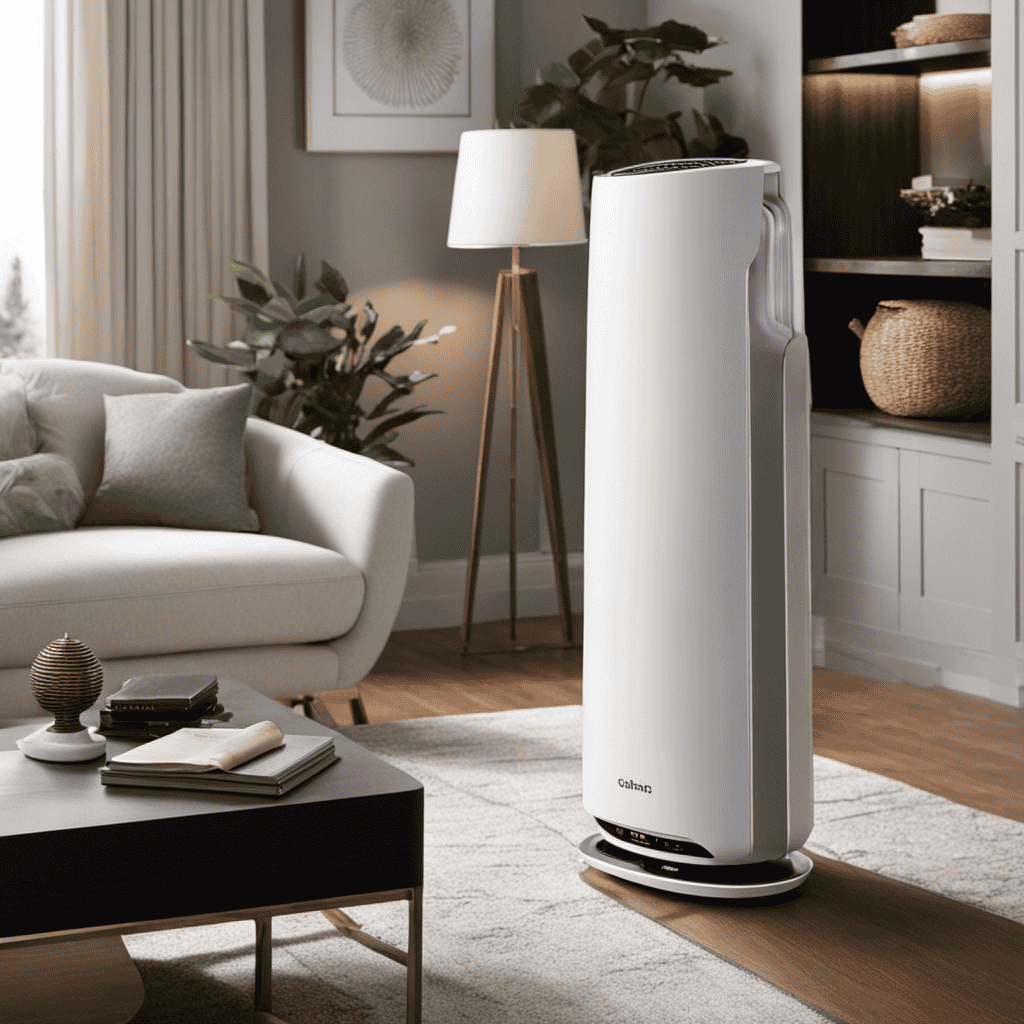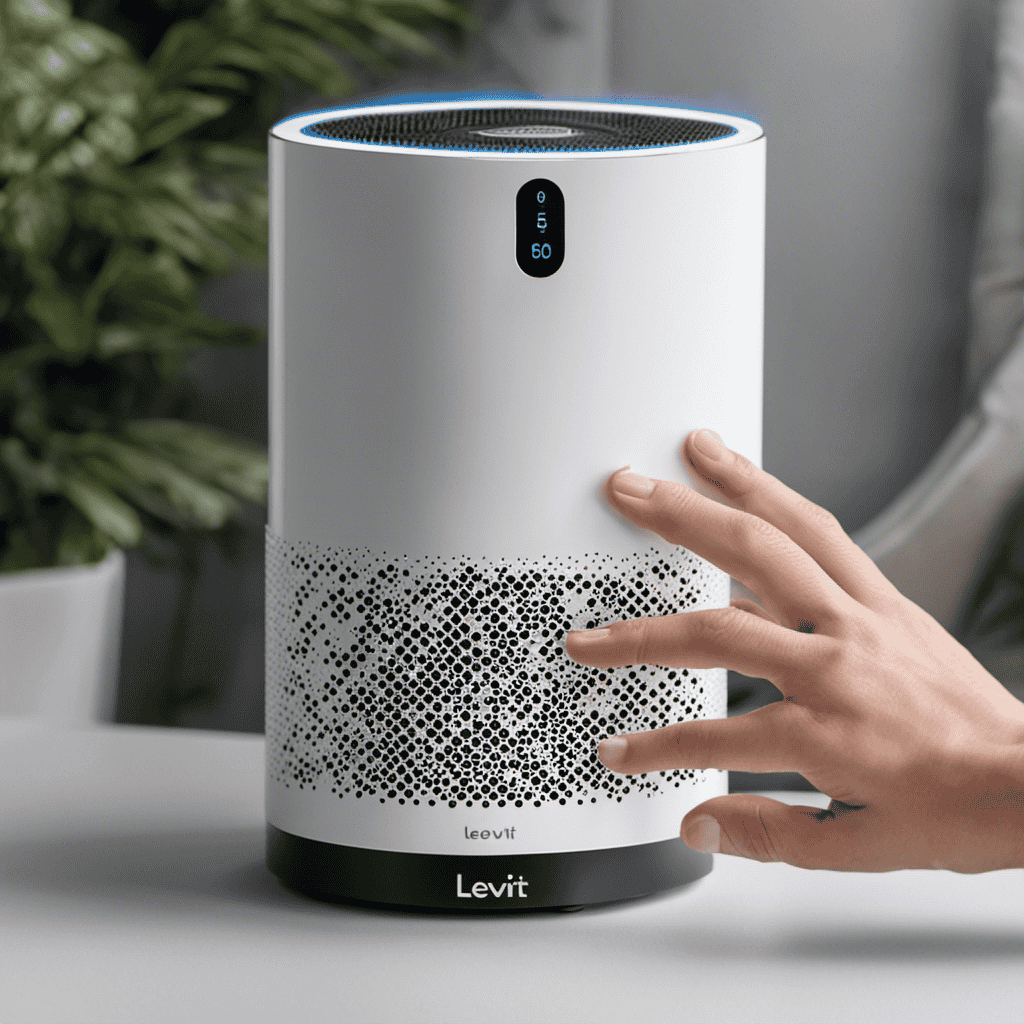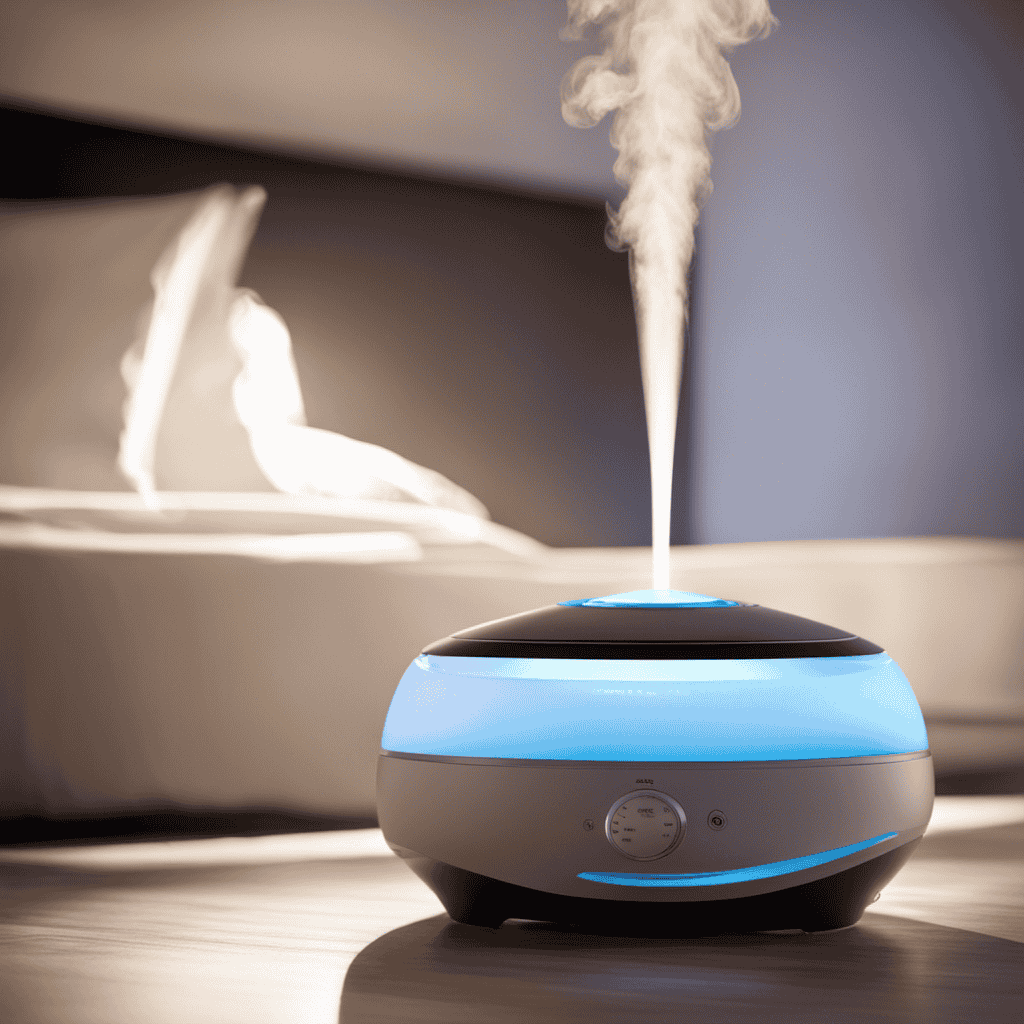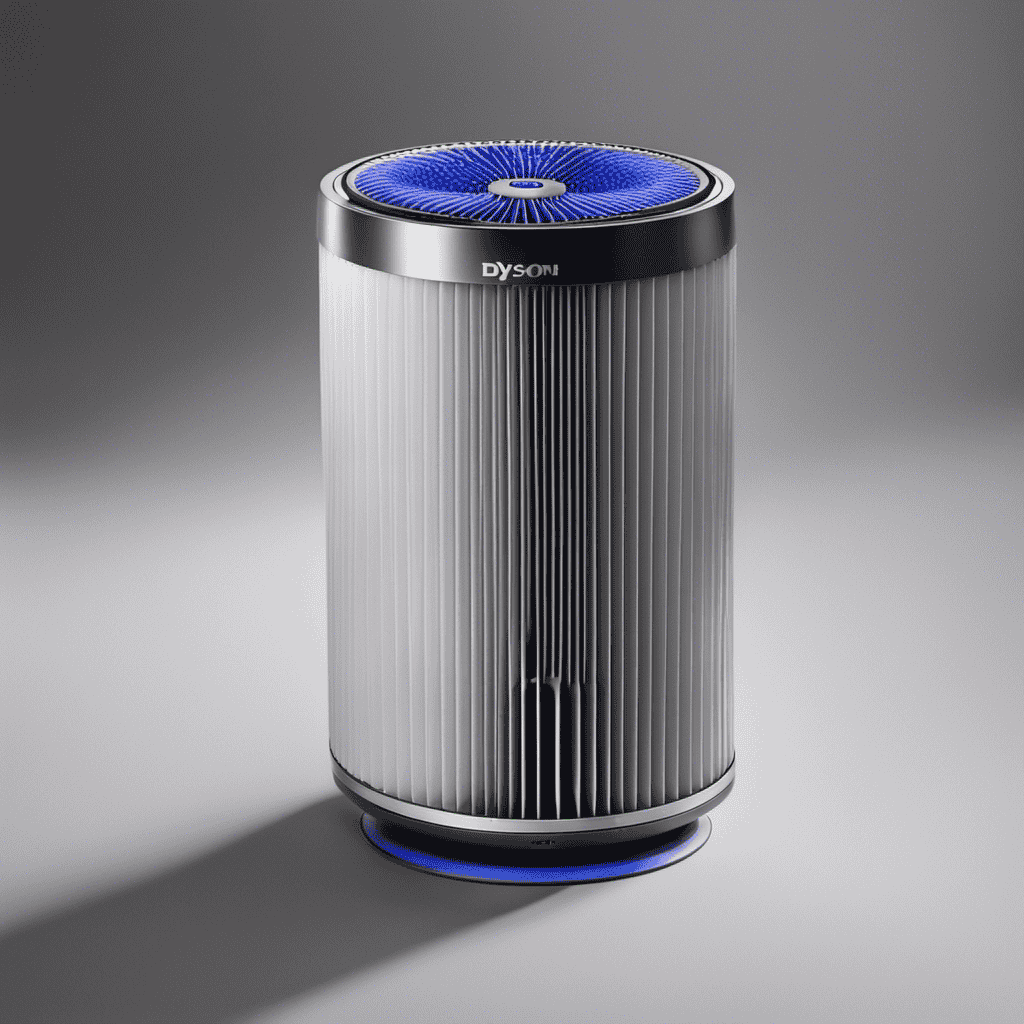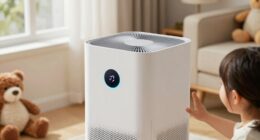I have to be honest, dealing with asthma on a daily basis can be challenging. However, I want to share with you that discovering some relief could be as easy as purchasing an air purifier.
In this article, we’re going to explore the impact of air quality on asthma symptoms and understand how air purifiers can play a crucial role in managing this condition.
We’ll delve into the effectiveness of air purifiers in reducing asthma triggers and provide tips for choosing the right one.
So, let’s take a deep breath and dive into the world of air purifiers and asthma relief.
Key Takeaways
- Air pollution is a major trigger for asthma attacks and worsens respiratory health.
- Air purifiers can filter out harmful particles and pollutants from the air, improving its quality.
- Breathing in clean air improves respiratory function and overall lung health.
- Air purifiers significantly improve the lives of asthma sufferers by reducing triggers and improving overall well-being.
The Impact of Air Quality on Asthma Symptoms
If you have asthma, improving the air quality around you can help alleviate your symptoms. Air pollution is a major trigger for asthma attacks and can worsen respiratory health. When we breathe in polluted air, it irritates our airways and increases inflammation, making it harder for us to breathe. This can lead to coughing, wheezing, and shortness of breath, all common symptoms of asthma.
Reducing exposure to air pollution is crucial for managing asthma. One way to do this is by using an air purifier. An air purifier is a device that filters out harmful particles and pollutants from the air, improving its quality. It can remove allergens like dust mites, pet dander, pollen, and even smoke particles. By removing these triggers from the air, an air purifier can help prevent asthma attacks and reduce symptoms.
Research has shown that using air purifiers can be beneficial for individuals with asthma. Studies have found that air purifiers can reduce the levels of indoor air pollutants, leading to improved respiratory health and fewer asthma symptoms. However, it is important to note that not all air purifiers are created equal. Look for a purifier that is specifically designed to capture allergens and particles that trigger asthma symptoms.
Understanding the Role of Air Purifiers in Asthma Management
Understanding how air purifiers can assist in managing asthma is crucial. As someone who has lived with asthma for many years, I have personally experienced the benefits of using an air purifier in my home.
Here are three key reasons why air purifiers are beneficial for individuals with asthma:
-
Reduction of airborne triggers: Air purifiers are designed to filter out common asthma triggers such as dust mites, pet dander, pollen, and mold spores. By removing these particles from the air, air purifiers can significantly reduce the presence of triggers that can worsen asthma symptoms.
-
Improved indoor air quality: Indoor air can be more polluted than outdoor air, especially in urban areas. Air purifiers help to improve indoor air quality by removing pollutants and irritants, creating a cleaner and healthier environment for individuals with asthma.
-
Enhanced respiratory function: Breathing in clean air can improve respiratory function and overall lung health. By using an air purifier, individuals with asthma may experience fewer asthma attacks, reduced wheezing, and better control of their symptoms.
Despite the numerous benefits, there are some misconceptions surrounding air purifiers. It is important to address these to have a better understanding of how they can truly assist in managing asthma.
How Air Purifiers Filter Indoor Air Contaminants
Air purifiers work by filtering out common indoor air contaminants, such as dust mites, pet dander, pollen, and mold spores. These pollutants can trigger asthma symptoms and exacerbate respiratory conditions. As someone who suffers from asthma, I understand the importance of clean air for respiratory health.
Air pollution, both outdoor and indoor, can have a significant impact on asthma symptoms. Fine particles, chemicals, and irritants in the air can cause inflammation in the airways, leading to coughing, wheezing, and shortness of breath.
To combat these respiratory irritants, air purifiers use various filtration methods to remove harmful particles from the air. High-efficiency particulate air (HEPA) filters are commonly used in air purifiers as they can capture up to 99.97% of particles as small as 0.3 microns. These filters effectively trap allergens like dust mites, pet dander, and pollen, providing cleaner air to breathe.
By removing these indoor air contaminants, air purifiers can help reduce asthma triggers and improve respiratory health. However, it is important to note that air purifiers are not a cure for asthma and should be used in conjunction with other asthma management strategies, such as medication and avoiding triggers.
Nevertheless, incorporating an air purifier into your home can create a healthier environment, minimizing the impact of indoor air pollution on your asthma symptoms.
The Effectiveness of Air Purifiers in Reducing Asthma Triggers
Using air purifiers can significantly reduce asthma triggers by filtering out common indoor air contaminants. Here are three reasons why air purifiers are beneficial for asthma relief:
-
Improved Air Quality: Air purifiers use advanced air purification technology to remove allergens, such as dust mites, pollen, pet dander, and mold spores, from the air. By eliminating these triggers, air purifiers create a cleaner and healthier indoor environment.
-
Reduced Respiratory Symptoms: Asthma sufferers often experience symptoms like coughing, wheezing, and shortness of breath when exposed to triggers in the air. Air purifiers help reduce these symptoms by eliminating the particles and irritants that can aggravate asthma.
-
Enhanced Sleep Quality: Poor air quality can disrupt sleep and worsen asthma symptoms, making it difficult for asthma sufferers to have a restful night. Air purifiers remove airborne pollutants, allowing asthma sufferers to breathe easier and enjoy a better night’s sleep.
In conclusion, air purifiers offer several benefits for asthma relief. By improving indoor air quality, reducing respiratory symptoms, and enhancing sleep quality, they can significantly improve the lives of asthma sufferers.
In the following section, we will discuss how to choose the right type of air purifier for optimal asthma relief.
Choosing the Right Type of Air Purifier for Asthma Relief
When it comes to selecting the right air purifier for your asthma relief, there are a few important factors to consider.
First, think about the size of the room where you will be using the air purifier. You want to make sure that the purifier is powerful enough to effectively clean the air in that space.
Next, consider the type of filter that the purifier uses. HEPA filters are highly recommended for asthma sufferers, as they are designed to remove small particles and allergens from the air, improving air quality.
Lastly, think about the noise level of the air purifier. Some models can be quite loud, which can be bothersome if you plan to use the purifier in your bedroom or other quiet spaces.
Choosing the right air purifier can play a crucial role in improving air quality and managing asthma symptoms. By removing airborne particles and allergens, a good air purifier can reduce triggers that can worsen asthma attacks.
It is important to invest in a purifier that is specifically designed for asthma relief, as not all purifiers are created equal. By considering factors such as room size, filter type, and noise level, you can select the air purifier that best suits your needs and provides the most effective asthma relief.
Key Considerations When Using an Air Purifier for Asthma
When using an air purifier for asthma relief, there are a few key considerations to keep in mind. These considerations can help ensure that you get the most out of your air purifier and maximize its effectiveness in reducing asthma symptoms.
-
Proper Placement: It is important to place the air purifier in the right location. Ideally, it should be placed in the room where you spend the most time, such as your bedroom or living room. This will allow the purifier to filter the air that you breathe the most.
-
Filter Replacement: Regularly replacing the filters is crucial for maintaining the efficiency of your air purifier. Different purifiers have different filter lifespans, so make sure to follow the manufacturer’s recommendations. A clogged or dirty filter will not be able to effectively remove asthma triggers from the air.
-
Air Purifier Size: Consider the size of the room when choosing an air purifier. A purifier that is too small may not be able to effectively clean the air in a large room, while one that is too big may be unnecessary and more expensive. Look for the square footage coverage listed on the purifier and choose accordingly.
Tips for Improving Indoor Air Quality to Complement Air Purifier Use
When it comes to improving indoor air quality, there are two key points to consider: natural air purifiers and the best air purifiers on the market.
Natural air purifiers, such as plants and salt lamps, can help remove toxins from the air and create a healthier environment.
On the other hand, choosing the best air purifier for your specific needs can be a daunting task, considering factors such as room size, filter type, and noise level.
In this discussion, I will explore both options to help you make an informed decision on how to improve the air quality in your home.
Natural Air Purifiers
If you’re looking for natural air purifiers, there are several options available to help with asthma. Here are three effective natural air purifiers that can provide numerous benefits for those with asthma:
-
Plants: Indoor plants like peace lilies, spider plants, and snake plants can help improve air quality by removing toxins and producing oxygen. They act as natural filters and can reduce the presence of allergens in the air.
-
Salt lamps: These lamps are made from Himalayan salt and emit negative ions when heated. These ions can help neutralize pollutants, allergens, and other harmful particles in the air, making it easier for asthmatics to breathe.
-
Activated charcoal: Charcoal is known for its ability to absorb impurities. Placing activated charcoal in a room can help eliminate odors, chemicals, and allergens from the air, providing relief for asthma sufferers.
Using these natural air purifiers alongside other asthma management techniques can greatly improve indoor air quality and help reduce asthma symptoms.
Best Air Purifiers?
One option for improving indoor air quality is by using natural air purifiers such as plants, salt lamps, and activated charcoal.
However, if you’re looking for the best air purifiers on the market, there are several options to consider.
When it comes to air purifier reviews, there are a few key factors to keep in mind.
First, consider the size of the room you want to purify. Different air purifiers have different coverage areas, so it’s important to choose one that matches the size of your space.
Second, consider the type of filtration system the air purifier uses. HEPA filters are widely regarded as the most effective at removing airborne particles, allergens, and pollutants.
Finally, consider any additional features or technologies that may be important to you, such as smart capabilities or noise levels.
The Link Between Air Purifiers and Asthma Prevention
There’s a clear link between air purifiers and their ability to prevent asthma symptoms. As someone who has struggled with asthma for years, I can attest to the benefits of using an air purifier in my home. Here are three reasons why air purifiers are effective in preventing asthma:
-
Removes airborne allergens: Air purifiers are designed to filter out common triggers such as dust mites, pet dander, mold spores, and pollen. By eliminating these allergens from the air, they can significantly reduce the likelihood of asthma attacks.
-
Improves indoor air quality: Indoor air pollution can be a major trigger for asthma symptoms. Air purifiers work by removing pollutants like smoke, chemicals, and volatile organic compounds (VOCs) from the air, creating a healthier environment for asthma sufferers.
-
Reduces asthma triggers: In addition to removing allergens and pollutants, air purifiers can also help control other triggers like odors and irritants. This can be particularly beneficial for individuals with sensitive airways, as it helps create a clean and fresh living space.
Using an air purifier has made a noticeable difference in managing my asthma symptoms.
Transitioning into the subsequent section about real-life success stories: asthma management with air purifiers, let’s explore how others have experienced similar benefits.
Real-Life Success Stories: Asthma Management With Air Purifiers
You can find inspiration and encouragement from real-life success stories of individuals who have effectively managed their asthma by incorporating air purifiers into their daily lives. These success stories showcase the significant relief and improved quality of life that can be achieved through the use of air purifiers.
One success story that stands out is that of Sarah, a young woman who had struggled with severe asthma for years. She had tried various medications and treatments, but still experienced frequent asthma attacks that affected her daily activities. Desperate for relief, Sarah decided to try using an air purifier in her home.
To her surprise, Sarah noticed a significant improvement in her asthma symptoms within a few weeks of using the air purifier. The device effectively filtered out allergens and pollutants from the air, reducing her exposure to triggers. As a result, Sarah experienced fewer asthma attacks and found herself relying less on medication for symptom relief.
Another success story comes from John, a father of two young children with asthma. Concerned about his children’s health, John decided to invest in air purifiers for their bedrooms. The air purifiers not only reduced their asthma symptoms but also improved their sleep quality. John was thrilled to see his children waking up refreshed and energized, free from the constant coughing and wheezing they had previously experienced.
These success stories highlight the potential benefits of incorporating air purifiers into an asthma management plan. While results may vary for each individual, these real-life examples demonstrate that air purifiers can provide significant relief and improve the overall well-being of individuals with asthma.
Frequently Asked Questions
Can Air Purifiers Completely Cure Asthma?
Air purifiers can be effective in reducing asthma symptoms by filtering out allergens and pollutants from the air. However, it is important to note that air purifiers alone cannot completely cure asthma.
Asthma is a chronic condition that requires a comprehensive treatment plan, including medication, lifestyle changes, and avoiding triggers. While air purifiers can improve indoor air quality and provide some relief, they should be used alongside other asthma treatments recommended by healthcare professionals.
Are Air Purifiers Suitable for All Types of Asthma?
Air purifiers can be beneficial for managing asthma symptoms, but their suitability may vary depending on the type of asthma. Factors such as air purifier maintenance and proper placement are important considerations.
Regularly cleaning or replacing filters is crucial for optimal performance. Additionally, placing the air purifier in the bedroom or areas where you spend the most time can help reduce asthma triggers.
It is advisable to consult with a healthcare professional to determine the most suitable air purifier for your specific type of asthma.
Can Air Purifiers Remove All Asthma Triggers From the Air?
Air purifiers are effective in removing asthma triggers from the air. Regular maintenance of the air purifier ensures its optimal performance.
However, it’s important to note that air purifiers may not eliminate all asthma triggers completely. While they can help reduce the presence of allergens like dust mites, pet dander, and pollen, other triggers like mold spores or strong odors may still remain.
It’s best to consult with a healthcare professional for personalized advice on managing asthma symptoms.
Do Air Purifiers Need to Be Used Constantly to Manage Asthma Symptoms?
Yes, air purifiers can be beneficial in managing asthma symptoms.
While they don’t need to be used constantly, regular maintenance is important to ensure their effectiveness.
Using air purifiers intermittently can still provide relief by reducing airborne triggers that can worsen asthma symptoms.
It’s important to clean or replace filters regularly and follow manufacturer’s instructions for optimal performance.
Consistent use of air purifiers, even if not constant, can help create a cleaner and healthier indoor environment for individuals with asthma.
Are Air Purifiers Effective in Preventing Asthma Attacks in Children?
Air purifiers have been shown to have a positive impact on overall respiratory health in children. They can help reduce allergens, pollutants, and irritants in the air, which are common triggers for asthma attacks. By improving indoor air quality, air purifiers can potentially benefit children with asthma by reducing the frequency and severity of their symptoms.
It is important to note that while air purifiers can be helpful, they should be used in conjunction with other asthma management strategies, such as medication and proper cleaning practices.
Conclusion
In conclusion, air purifiers can be a valuable tool in managing asthma symptoms. They act as guardians, diligently filtering out indoor air contaminants that can trigger asthma attacks.
By choosing the right type and using it correctly, individuals with asthma can experience relief and prevent future asthma episodes.
Just like a lighthouse guiding ships through treacherous waters, air purifiers provide a beacon of hope for those seeking clean and breathable air.
Remember, improving indoor air quality is a crucial step towards a healthier life with asthma.

